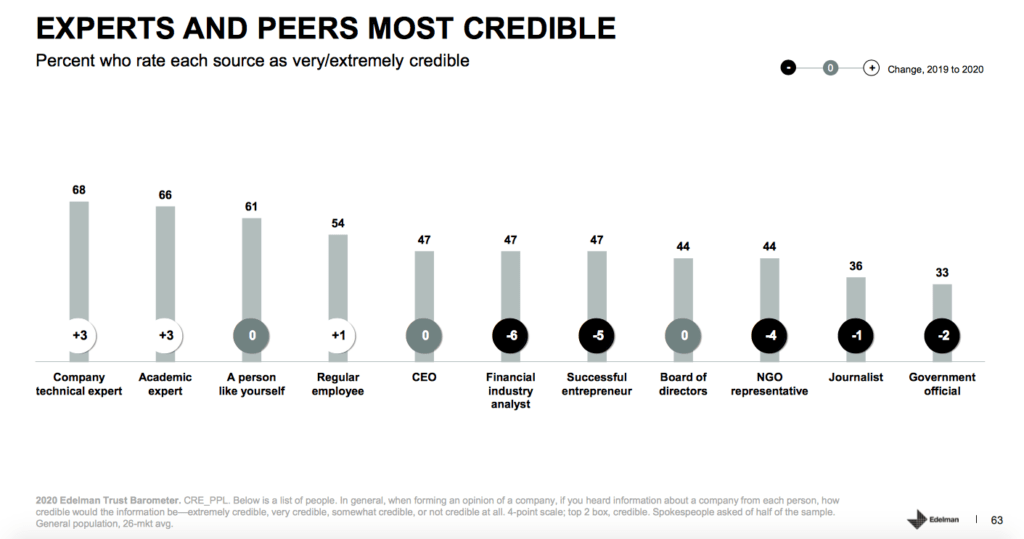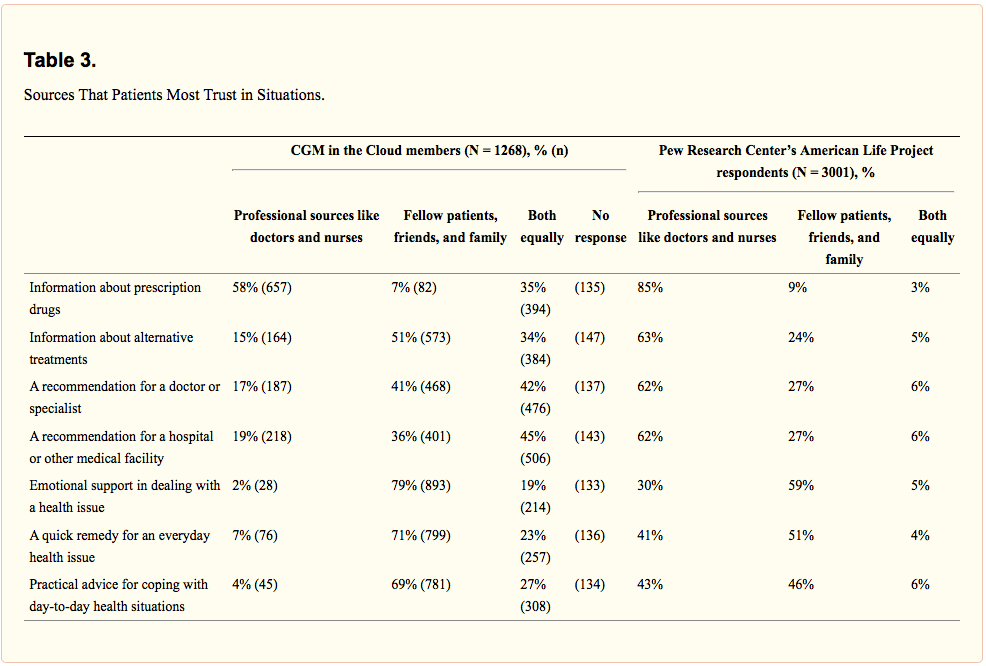
Inspired by a conversation with my FasterCures colleagues, I began looking into survey data related to trust and credibility, particularly:
What entities and resources do people turn to when they need advice about important topics?
Edelman, a global communications firm, has been measuring trust and credibility for 20 years. Their most recent Trust Barometer asked people in 26 markets:
Below is a list of people. In general, when forming an opinion of a company, if you heard information about a company from each person, how credible would the information be — extremely credible, very credible, somewhat credible, or not credible at all.
61% of respondents rated “a person like myself” to be extremely or very credible.
Also highly rated for credibility when it comes to a company: A company technical expert*; an academic expert; a regular employee.

* Side note: please let me know in the comments what you think “a company technical expert” means.
But what about health advice? What sources are considered credible? Tom Ferguson and Bill Kelly fielded a groundbreaking survey of an online patient community way back in 1999. They asked community members to rate the most useful resource for various dimensions of medical care, such as obtaining an accurate diagnosis or the most in-depth information on a condition.
In 2010, my Pew Research Center colleagues and I collaborated with Tom in writing a new question series, choosing the word helpful instead of useful:
“Overall, who do you think is more helpful when you need _______ [insert item]? Health professionals like doctors and nurses, or other sources, such as fellow patients, friends and family?”
The full results of the national survey are available in the 2011 report, “Peer-to-peer Health Care.”
In 2018, researchers replicated the series in a survey of members of a diabetes-related group, CGM in the Cloud. Results are laid out in the table below. Note that although the survey asked which sources are helpful, the title of the table changes the focus to trust.

Source: White K, Gebremariam A, Lewis D, et al. Motivations for Participation in an Online Social Media Community for Diabetes. J Diabetes Sci Technol. 2018;12(3):712-718. doi:10.1177/1932296817749611
Trust is different, I think, from helpfulness. There are resources I may find helpful, but do I trust them? That’s a higher bar for me.
Useful, helpful, trustworthy, credible…what do you think? Are they all connected?
I wanted an image to convey “birds of a feather flock together” and found this gorgeous shot of sandhill cranes taking flight at sunrise, at Platte River near Kearney, Nebraska, by Diana Robinson on Flickr.
I’m hoping people will chime in with other studies about trust, credibility, usefulness, etc.
One study I remembered this morning, just a couple hours after this published (don’t you hate that?):
Influences on Immunization Decision-Making among US Parents of Young Children, by Chung, Y., Schamel, J., Fisher, A., & Frew, P. M. (2017). Maternal and child health journal, 21(12), 2178–2187. https://doi.org/10.1007/s10995-017-2336-6
One key quote about trust:
“Healthcare providers (HCP) are the most consistently reported trusted vaccine information source among parents holding varying vaccination attitudes.”
Here are the results of the study:
“Delayers and refusers were more likely than acceptors to know someone whose child experienced a severe reaction to a vaccine or delayed/refused vaccine(s). High proportions of delayers (2012: 33.4%, 2014: 33.9%) and refusers (2012: 49.6%, 2014: 58.6%) reported selecting their healthcare provider based on whether the provider would allow them to delay/refuse vaccines. Providers were the most frequently reported trusted vaccine information source among all parents, though more often by acceptors than refusers (2012, 2014: p < 0.01). We found differing patterns of provider advice-seeking and internet as a reliable vaccine information source by group. Among those who had considered delay/refusal, trust in their healthcare provider’s advice was the most common reason cited for their decision reversal." Please do click through to read the article if you’re interested — there is plenty to dig into and discuss.
The Edelman report gives me a hundred questions to dig into.
I don’t have studies for you, but I too was wondering about helpfulness vs trust. How would you characterize the difference? I bet the people who did that to the title either didn’t notice any difference or assumed respondents would only find something helpful if they trusted it.
Hey, friends @DanaMLewis and @JoyceLee are co-authors – I’ll drop ’em an ask on Twitter! (As co-authors they may not have had much say in that though)
While writing this post I wrote to Joyce to ask if respondents saw the word “trust” (which would have changed the context of the question) and she & her colleague Emily Dhadphale confirmed: No, they did not.
The researchers had indeed marked that question as one that implicated “trust” in their own minds — and then transferred that to the table heading when they wrote up the findings — but it was not part of the survey that respondents saw.
My practice is to use this blog as an outboard memory, so here’s a thread I’m porting over from Twitter:
Bryan Vartabedian, MD (@Doctor_V) shared a link to this post with the essential question: What entities and resources do people turn to when they need advice about important topics?
Berci Meskó, MD, PhD (@Berci) replied: I go to Reddit more often these days than before. Maybe I trust a community more than media channels.
@Doctor_V: That’s a very interesting observation, Berci. The statistics on the number of Facebook groups that are ‘closed’ versus open show the people want tighter, personal networks rather than a wide networks… Maybe the Dunbar Number concept is real
@SusannahFox (me :): Does it depend on the topic?
Example: For “best practical knowledge of my condition” e-patients in 1999 said they’d choose:
Online Groups: 68%
Specialist MD: 23%
Primary Care MD: 8%
That 1999 finding maps well with the 2018 CGM in the Cloud community survey question about “practical advice for day-to-day health situations.” Members said they’d choose:
Fellow patients, friends, family: 69%
Professional sources, like MDs and RNs: 4%
That’s the end of the Twitter conversation — and the beginning of taking the thread further, I hope.
Note that when we at Pew Research fielded that “practical advice” question in a national survey in 2011, respondents were split down the middle: 46% for friends/peers/family vs. 43% for professional sources. Here’s one key element: Not many of them were likely to have had firsthand experience with an expert peer health community, unlike the CGM in the Cloud group or the pioneer self-helpers included in the 1999 survey.
I want to highlight another element of Berci & Bryan’s responses: The use of mainstream (non-health) platforms to create, gather, and share health information.
Reddit and Facebook are very effective catchment areas for people who are looking for community and maybe need some advice from time to time. People flow in, get caught in the current, and end up staying there in the catchment pool. Reddit, Facebook, and other online platforms are “good enough” solutions to what people want (and even crave): connection. (See also: How connection can lead to change.)
But what happens when you realize that your little pool is being polluted with misinformation — or monitored without your knowledge? What happens if trust breaks down? That’s a danger that groups like the Light Collective are trying to alert us to.
How might we have conversations about trust and credibility that include the mainstream platforms AND the e-patient activists concerned about security and information pollution?
Lots to unpack here (obvi), but here’s my short take:
– IMO, “a company technical expert” is a technical expert from within a sector company; IOW, I’d trust an aviation engineer at XYZ Aviation Engineering on airplane safety recommendations before I’d trust, say, a general engineering human or someone from a completely separate industry
– The issue for health conditions/healthcare is split – as the Pew vs CGM in the Cloud results show – between clinical experts, who are seen as credible/useful/helpful (mostly, but YMMV)), and peer groups where you get a more unvarnished version of what life is like dealing with [whatever medical issue]
– This whole landscape gets muddy with the mushrooming of peer communities on social media platforms, where who you’re actually talking to can be … uncertain; is this really a person with [my issue] or [clinical/professional expertise in my issue], or not?
That’s where trust has broken down – I’ve seen countless instances of commercial-ish interests (pharma, health systems, health insurers, political operatives of various stripes) joining online communities to monitor traffic and/or exert influence in that community. Sometimes what they’re flogging is helpful, but commercial interest in the issue/solution kinda burns that trust thing.
That the entire internet has become a giant sinkhole of endless ad-tech is evidence that trust is being shredded in service of somebody’s corporate bottom line. How to shift *that* is the challenge of our very janky time.
Thanks, Casey! Great points.